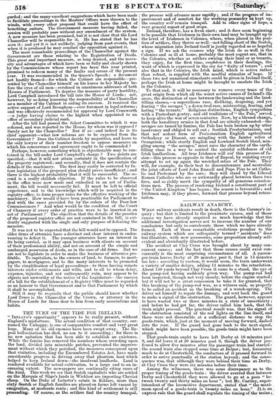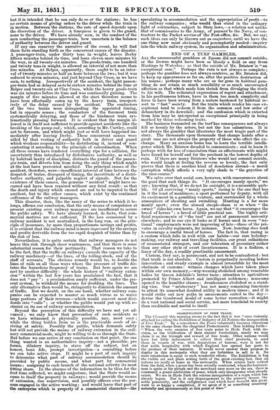RAILWAY ANARCHY:
WHF,N railway accidents result in death, there is the Coroner's in- quiry ; but that is limited to the proximate causes, and of those causes we have already acquired so much knowledge that the additional investigation serves not to increase the number of our conclusions but only to corroborate those which we have already formed. Each of those remarkable evolutions peculiar to the railway system which are colloquially termed " accidents." does but illustrate, with new accessories, some proposition already self- evident and abundantly illustrated before.
The accident at Clay Cross was brought about by many con- current causes • and the fact that those causes could. exist con- currently is the most surprising circumstance of alL A. passen- ger-train leaves Derby at 20 minutes past 9, that is 15 minutes too late ; according to custom, it would seem, the train underwent. a variety of smaller delays, adding 11 minutes to the retardation. About 150 yards beyond Clay Cross it came to a stand, the eye of the pump-rod having suddenly given way. The pump-rod had inspected, nspected, though not very closely, before the engine started; but it will not be a great concession to take it for granted, that this breaking-of the pump-rod was, as a witness said, as properly to be called an accident as the breaking of a watch-spring. The driver set himself to repair the damage, and sent back the guard to make a signal of the obstruction. The guard, however, appears to have wasted two or three minutes-in a state of uncertaint ; and before he had got far, the driver called him back, that the train might proceed. The practical result was, that the signal of the obstruction consisted of the red lights on the line itself, and those were not discernible at a sufficient distance to stop the goods-train, which, just at the moment of moving forward, dashed into the rear. If the guard had gone back to the next signal, which might have been possible, the goods-train might have been. stopped.
That goods-train ought to have left Derby at 10 minutes- past 9, and did leave it at 20 minutes past 9, though the driver pro- fessed to allow five minutes after the passenger-train-had started: the second train also stopped some time at Belper ; but, foreseeing much to do at Chesterfield the conductors of it pressed forward in order to arrive punctually at the station beyond ; and the conse- quence was, that although they were behind their time at Derby, at Clay Cross they were six minutes before their time.
Among the witnesses, there was some discrepancy as to the proper timing of the goods-train : the driver averred that between Derby and Chesterfield they were allowed to go at a pace " be- tween twenty and thirty miles an hour "; but Mr. Curtley, super- intendent of the locomotive department, stated that " the maxi- mum speed. of a goods-train is twenty miles an. hour." It is an. express rule that the guard shall regulate the timing of the trains;,. but it is intended that he can only do so at the stations ; he has no certain means of giving orders to the driver while the train in in motion. Between the stations, the rate of speed depends upon the discretion of the driver. A timepiece is given to the guard, none to the driver. We have already seen, in the conduct. of the men conducting the passenger-train, how uncertain, is the balance of authority between the driver and guard.
If any one resurvey the narrative of the event, he will find these facts standing forth as the concurrent causes of the disaster. A passenger-train, under thirty tons in weight, leaves Derby fifteen minutes behind its time, and loses eleven more minutes by the way, in all twenty:six minutes. The goods-train, one hundred and twenty tons in weight, is allowed an interval of not more than five minutes: At Belper, apparently, there ought to be an inter- val of twenty minutes or half an hour between the two ; but it was reduced. to seven minutes, and just beyond Clay Cross, as we have seen, to nothing. Irrespectively of the accident, the light passen- ger-train bad so delayed as to be sixteen minutes behind its time at Belper and twenty-six at Clay Cross, while the heavy goods-train was six minutes before its time and was continually gaining. The margin of five minutes allowed at the start therefore seems to have been effectually eaten up by the heavy train, irrespect- ively. of the delay caused by the accident. The conductors of the two trains were disregarding the appointed timing, but in opposite senses ; the conductors of the foremost train systematically delaying, and those of the hindmost train sys- tematically pressing forward. It is evident that the margin al- lowed is in itself not sufficient to provide against accidents like the breaking of the pump-rod ; which, according to Mr. Curtley, could not be foreseen, and which might just as well have happened im- mediately after leaving Derby. These concurrent causes were aided by that vesting of authority both in driver and guard which weakens responsibility—by distributing it, instead of con- centrating it according to the principle of subordination. When all these oauses have rendered everything ripe for a collision, the uncertainty thus introduced by distributive authority, as well as by habitual laxity of discipline, distracts the guard of the passen- ger-train, and diverts him from doing the only thing which might at the last have prevented mischief. The principal causes of the accident, therefore, were—insufficient interval of time between the despatch of trains, disregard of timing, the incertitude of a distri- butive authority, and palpable neglect of signals. But for the existence of these causes, the genuine " accident" might have oc- curred and have been repaired without any fatal result : so that the death and injury which ensued are not to be imputed to that accident, but to the other causes, which exist by the continued sufferance of the railway managers. This disaster, then, like the many of the series to which it be- longs, affirms our conclusion, that the only means of compulsion at present existing over railway managers are insufficient to secure the public safety. We have already learned, de facto, that com- mercial motives are not sufficient. If the loss occasioned by a railway accident is not neutralized, in the long run, on the prin- ciple of insurance' by more than proportionate savings and profits, it is evident that the railway mind is more impressed by the savings and profits derivable from the too rapid despatch of trains than by the risk of loss.
Nevertheless, it is quite certain that railway managers do not brave this risk through sheer wantonness, and that there is some substantial reason for their pertinacity. That reason we take to be the fact, that the traffic on railways exceeds the capacity of the railway machinery—of the lines, of the rolling-stock, and of the staff of servants. The obvious remedy would be, to double the lines of rails on all those ways where the pressure of traffic dic- tates the hazardous frequency of trains. But here again we are met by another difficulty : the whole history of " railway exten- sion" within the last few years has proclaimed the fact, that it does not " pay " ; a proclamation amply sufficient, under the pre- sent system,. to withhold the means for doubling the lines. The only alternative then would be, stringently to diminish the amount of traffic. But we doubt, on the one hand, whether railway com- panies can be expected to muster so much virtue as to waive large portions of their revenue—which would convert most divi- dends into " calls " ; or whether the public would put up with re- straint on its use of railway accommodation. Beyond the perception of this difficulty we have not yet ad- vanced ; we only know that prevention of such accidents as we have witnessed, is physically possible, nay, most easy ; while the thing hidden from us is the practicable mode of ar- riving at safety. Possibly the public, which demands safety but will not provide the means of railway extension in the ordi- nary commercialmode, might be willing to do so through the State. But before we can arrive at any conclusion on that point, the one thing wanted is an authoritative inquiry—not a plausible, pro fermi, dilatory inquiry, to stave off the subject, but an honest, bona fide, prompt investigation—a consulting before we can take active steps. It might be a part of such inquiry to' determine what part of railway accommodation should be provided by public means, and what part by commercial means ; assigning to each branch of the national activity its most fitting share. In the absence of the information. to be thus for the first' time collected, we might conjecture, that the State would as- sume to itself the property in railways ; would provide the means of extension,, due supervision, and possibly officers over the per- sons engaged{ in the active working ;• and would leave that part of the enterprise which is properly of a commercial character—the
speculating in accommodation and the appropriation of profit—to the railway companies; would thus stand in the ordinary light of contractors, subject to State lawis—a relation not unlike that of commissaries to the Army, or pursers-to the Navy, of con- tractors to the Packet service of the Post-office, &C; But, we- say; such ideas can only be thrown out as conjecture, until we have the one thing now most obviously and peremptorily needed inquiry into the whole railway system, its organization and administration.



























 Previous page
Previous page